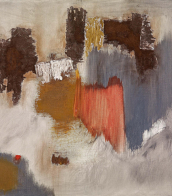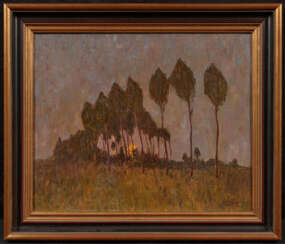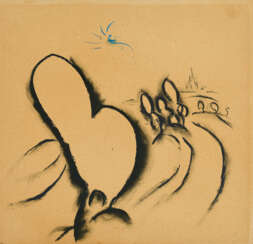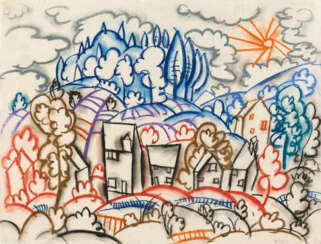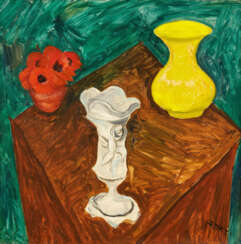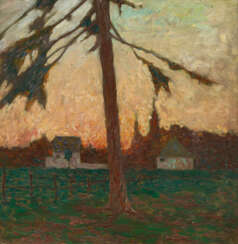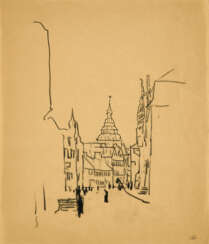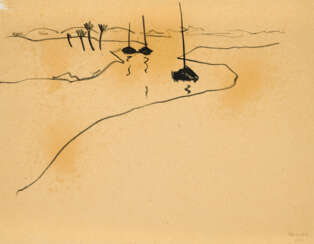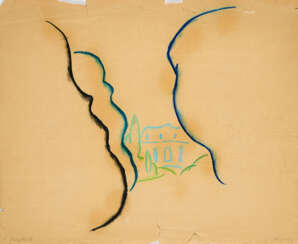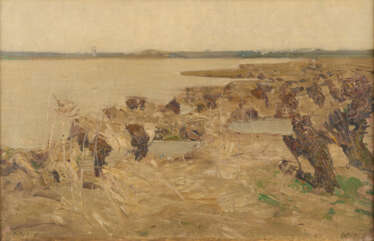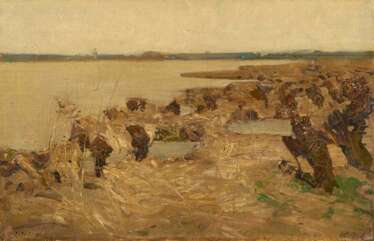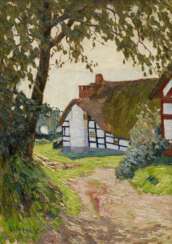Walter Ofey (1882 - 1930) — Auction price
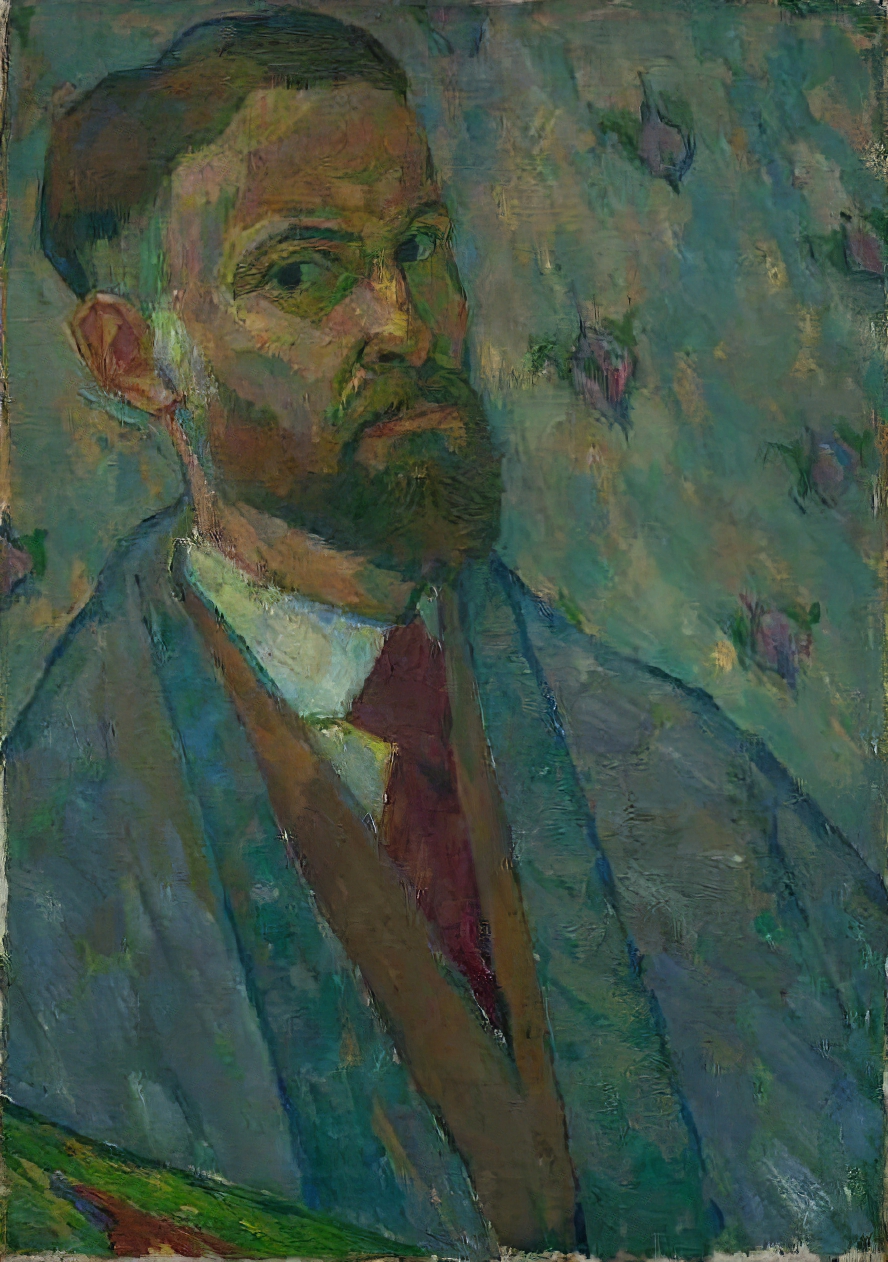
Walter Ophey was a German artist. He was known for his modernist paintings, which often depicted landscapes and still-life scenes.
Ophey studied at the Academy of Fine Arts in Düsseldorf. His early work was influenced by Impressionism, but he later became associated with the Expressionist movement.
In 1909 Ophey, together with some other Düsseldorf artists, formed the artistic group the Special Union (Sonderbund). The first chairman of the Special Union was the well-known German philanthropist and collector Carl Ernst Osthaus. In the following years this group became one of the most powerful avant-garde art movements in Germany.
Ophey's paintings are characterized by their bright colors and bold, simplified forms. He often depicted rural landscapes and still-life scenes, infusing them with a sense of emotional intensity. He was also known for his use of color, which he used to convey mood and atmosphere.
Ophey's work was exhibited extensively during his lifetime, including at the Berlin Secession and the Salon d'Automne in Paris. Despite his relatively short career, he was recognized as an important figure in the development of modernist painting in Germany.
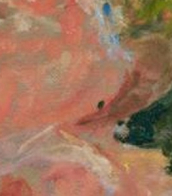

Walter Ophey was a German artist. He was known for his modernist paintings, which often depicted landscapes and still-life scenes.
Ophey studied at the Academy of Fine Arts in Düsseldorf. His early work was influenced by Impressionism, but he later became associated with the Expressionist movement.
In 1909 Ophey, together with some other Düsseldorf artists, formed the artistic group the Special Union (Sonderbund). The first chairman of the Special Union was the well-known German philanthropist and collector Carl Ernst Osthaus. In the following years this group became one of the most powerful avant-garde art movements in Germany.
Ophey's paintings are characterized by their bright colors and bold, simplified forms. He often depicted rural landscapes and still-life scenes, infusing them with a sense of emotional intensity. He was also known for his use of color, which he used to convey mood and atmosphere.
Ophey's work was exhibited extensively during his lifetime, including at the Berlin Secession and the Salon d'Automne in Paris. Despite his relatively short career, he was recognized as an important figure in the development of modernist painting in Germany.
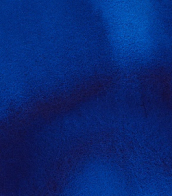

Walter Ophey was a German artist. He was known for his modernist paintings, which often depicted landscapes and still-life scenes.
Ophey studied at the Academy of Fine Arts in Düsseldorf. His early work was influenced by Impressionism, but he later became associated with the Expressionist movement.
In 1909 Ophey, together with some other Düsseldorf artists, formed the artistic group the Special Union (Sonderbund). The first chairman of the Special Union was the well-known German philanthropist and collector Carl Ernst Osthaus. In the following years this group became one of the most powerful avant-garde art movements in Germany.
Ophey's paintings are characterized by their bright colors and bold, simplified forms. He often depicted rural landscapes and still-life scenes, infusing them with a sense of emotional intensity. He was also known for his use of color, which he used to convey mood and atmosphere.
Ophey's work was exhibited extensively during his lifetime, including at the Berlin Secession and the Salon d'Automne in Paris. Despite his relatively short career, he was recognized as an important figure in the development of modernist painting in Germany.


Walter Ophey was a German artist. He was known for his modernist paintings, which often depicted landscapes and still-life scenes.
Ophey studied at the Academy of Fine Arts in Düsseldorf. His early work was influenced by Impressionism, but he later became associated with the Expressionist movement.
In 1909 Ophey, together with some other Düsseldorf artists, formed the artistic group the Special Union (Sonderbund). The first chairman of the Special Union was the well-known German philanthropist and collector Carl Ernst Osthaus. In the following years this group became one of the most powerful avant-garde art movements in Germany.
Ophey's paintings are characterized by their bright colors and bold, simplified forms. He often depicted rural landscapes and still-life scenes, infusing them with a sense of emotional intensity. He was also known for his use of color, which he used to convey mood and atmosphere.
Ophey's work was exhibited extensively during his lifetime, including at the Berlin Secession and the Salon d'Automne in Paris. Despite his relatively short career, he was recognized as an important figure in the development of modernist painting in Germany.


Walter Ophey was a German artist. He was known for his modernist paintings, which often depicted landscapes and still-life scenes.
Ophey studied at the Academy of Fine Arts in Düsseldorf. His early work was influenced by Impressionism, but he later became associated with the Expressionist movement.
In 1909 Ophey, together with some other Düsseldorf artists, formed the artistic group the Special Union (Sonderbund). The first chairman of the Special Union was the well-known German philanthropist and collector Carl Ernst Osthaus. In the following years this group became one of the most powerful avant-garde art movements in Germany.
Ophey's paintings are characterized by their bright colors and bold, simplified forms. He often depicted rural landscapes and still-life scenes, infusing them with a sense of emotional intensity. He was also known for his use of color, which he used to convey mood and atmosphere.
Ophey's work was exhibited extensively during his lifetime, including at the Berlin Secession and the Salon d'Automne in Paris. Despite his relatively short career, he was recognized as an important figure in the development of modernist painting in Germany.
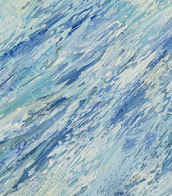

Walter Ophey was a German artist. He was known for his modernist paintings, which often depicted landscapes and still-life scenes.
Ophey studied at the Academy of Fine Arts in Düsseldorf. His early work was influenced by Impressionism, but he later became associated with the Expressionist movement.
In 1909 Ophey, together with some other Düsseldorf artists, formed the artistic group the Special Union (Sonderbund). The first chairman of the Special Union was the well-known German philanthropist and collector Carl Ernst Osthaus. In the following years this group became one of the most powerful avant-garde art movements in Germany.
Ophey's paintings are characterized by their bright colors and bold, simplified forms. He often depicted rural landscapes and still-life scenes, infusing them with a sense of emotional intensity. He was also known for his use of color, which he used to convey mood and atmosphere.
Ophey's work was exhibited extensively during his lifetime, including at the Berlin Secession and the Salon d'Automne in Paris. Despite his relatively short career, he was recognized as an important figure in the development of modernist painting in Germany.


Walter Ophey was a German artist. He was known for his modernist paintings, which often depicted landscapes and still-life scenes.
Ophey studied at the Academy of Fine Arts in Düsseldorf. His early work was influenced by Impressionism, but he later became associated with the Expressionist movement.
In 1909 Ophey, together with some other Düsseldorf artists, formed the artistic group the Special Union (Sonderbund). The first chairman of the Special Union was the well-known German philanthropist and collector Carl Ernst Osthaus. In the following years this group became one of the most powerful avant-garde art movements in Germany.
Ophey's paintings are characterized by their bright colors and bold, simplified forms. He often depicted rural landscapes and still-life scenes, infusing them with a sense of emotional intensity. He was also known for his use of color, which he used to convey mood and atmosphere.
Ophey's work was exhibited extensively during his lifetime, including at the Berlin Secession and the Salon d'Automne in Paris. Despite his relatively short career, he was recognized as an important figure in the development of modernist painting in Germany.
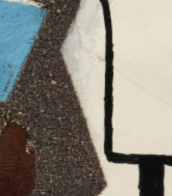

Walter Ophey was a German artist. He was known for his modernist paintings, which often depicted landscapes and still-life scenes.
Ophey studied at the Academy of Fine Arts in Düsseldorf. His early work was influenced by Impressionism, but he later became associated with the Expressionist movement.
In 1909 Ophey, together with some other Düsseldorf artists, formed the artistic group the Special Union (Sonderbund). The first chairman of the Special Union was the well-known German philanthropist and collector Carl Ernst Osthaus. In the following years this group became one of the most powerful avant-garde art movements in Germany.
Ophey's paintings are characterized by their bright colors and bold, simplified forms. He often depicted rural landscapes and still-life scenes, infusing them with a sense of emotional intensity. He was also known for his use of color, which he used to convey mood and atmosphere.
Ophey's work was exhibited extensively during his lifetime, including at the Berlin Secession and the Salon d'Automne in Paris. Despite his relatively short career, he was recognized as an important figure in the development of modernist painting in Germany.


Walter Ophey was a German artist. He was known for his modernist paintings, which often depicted landscapes and still-life scenes.
Ophey studied at the Academy of Fine Arts in Düsseldorf. His early work was influenced by Impressionism, but he later became associated with the Expressionist movement.
In 1909 Ophey, together with some other Düsseldorf artists, formed the artistic group the Special Union (Sonderbund). The first chairman of the Special Union was the well-known German philanthropist and collector Carl Ernst Osthaus. In the following years this group became one of the most powerful avant-garde art movements in Germany.
Ophey's paintings are characterized by their bright colors and bold, simplified forms. He often depicted rural landscapes and still-life scenes, infusing them with a sense of emotional intensity. He was also known for his use of color, which he used to convey mood and atmosphere.
Ophey's work was exhibited extensively during his lifetime, including at the Berlin Secession and the Salon d'Automne in Paris. Despite his relatively short career, he was recognized as an important figure in the development of modernist painting in Germany.
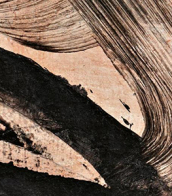

Walter Ophey was a German artist. He was known for his modernist paintings, which often depicted landscapes and still-life scenes.
Ophey studied at the Academy of Fine Arts in Düsseldorf. His early work was influenced by Impressionism, but he later became associated with the Expressionist movement.
In 1909 Ophey, together with some other Düsseldorf artists, formed the artistic group the Special Union (Sonderbund). The first chairman of the Special Union was the well-known German philanthropist and collector Carl Ernst Osthaus. In the following years this group became one of the most powerful avant-garde art movements in Germany.
Ophey's paintings are characterized by their bright colors and bold, simplified forms. He often depicted rural landscapes and still-life scenes, infusing them with a sense of emotional intensity. He was also known for his use of color, which he used to convey mood and atmosphere.
Ophey's work was exhibited extensively during his lifetime, including at the Berlin Secession and the Salon d'Automne in Paris. Despite his relatively short career, he was recognized as an important figure in the development of modernist painting in Germany.


Walter Ophey was a German artist. He was known for his modernist paintings, which often depicted landscapes and still-life scenes.
Ophey studied at the Academy of Fine Arts in Düsseldorf. His early work was influenced by Impressionism, but he later became associated with the Expressionist movement.
In 1909 Ophey, together with some other Düsseldorf artists, formed the artistic group the Special Union (Sonderbund). The first chairman of the Special Union was the well-known German philanthropist and collector Carl Ernst Osthaus. In the following years this group became one of the most powerful avant-garde art movements in Germany.
Ophey's paintings are characterized by their bright colors and bold, simplified forms. He often depicted rural landscapes and still-life scenes, infusing them with a sense of emotional intensity. He was also known for his use of color, which he used to convey mood and atmosphere.
Ophey's work was exhibited extensively during his lifetime, including at the Berlin Secession and the Salon d'Automne in Paris. Despite his relatively short career, he was recognized as an important figure in the development of modernist painting in Germany.


Walter Ophey was a German artist. He was known for his modernist paintings, which often depicted landscapes and still-life scenes.
Ophey studied at the Academy of Fine Arts in Düsseldorf. His early work was influenced by Impressionism, but he later became associated with the Expressionist movement.
In 1909 Ophey, together with some other Düsseldorf artists, formed the artistic group the Special Union (Sonderbund). The first chairman of the Special Union was the well-known German philanthropist and collector Carl Ernst Osthaus. In the following years this group became one of the most powerful avant-garde art movements in Germany.
Ophey's paintings are characterized by their bright colors and bold, simplified forms. He often depicted rural landscapes and still-life scenes, infusing them with a sense of emotional intensity. He was also known for his use of color, which he used to convey mood and atmosphere.
Ophey's work was exhibited extensively during his lifetime, including at the Berlin Secession and the Salon d'Automne in Paris. Despite his relatively short career, he was recognized as an important figure in the development of modernist painting in Germany.
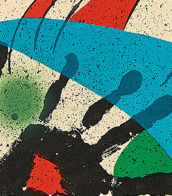

Walter Ophey was a German artist. He was known for his modernist paintings, which often depicted landscapes and still-life scenes.
Ophey studied at the Academy of Fine Arts in Düsseldorf. His early work was influenced by Impressionism, but he later became associated with the Expressionist movement.
In 1909 Ophey, together with some other Düsseldorf artists, formed the artistic group the Special Union (Sonderbund). The first chairman of the Special Union was the well-known German philanthropist and collector Carl Ernst Osthaus. In the following years this group became one of the most powerful avant-garde art movements in Germany.
Ophey's paintings are characterized by their bright colors and bold, simplified forms. He often depicted rural landscapes and still-life scenes, infusing them with a sense of emotional intensity. He was also known for his use of color, which he used to convey mood and atmosphere.
Ophey's work was exhibited extensively during his lifetime, including at the Berlin Secession and the Salon d'Automne in Paris. Despite his relatively short career, he was recognized as an important figure in the development of modernist painting in Germany.


Walter Ophey was a German artist. He was known for his modernist paintings, which often depicted landscapes and still-life scenes.
Ophey studied at the Academy of Fine Arts in Düsseldorf. His early work was influenced by Impressionism, but he later became associated with the Expressionist movement.
In 1909 Ophey, together with some other Düsseldorf artists, formed the artistic group the Special Union (Sonderbund). The first chairman of the Special Union was the well-known German philanthropist and collector Carl Ernst Osthaus. In the following years this group became one of the most powerful avant-garde art movements in Germany.
Ophey's paintings are characterized by their bright colors and bold, simplified forms. He often depicted rural landscapes and still-life scenes, infusing them with a sense of emotional intensity. He was also known for his use of color, which he used to convey mood and atmosphere.
Ophey's work was exhibited extensively during his lifetime, including at the Berlin Secession and the Salon d'Automne in Paris. Despite his relatively short career, he was recognized as an important figure in the development of modernist painting in Germany.


Walter Ophey was a German artist. He was known for his modernist paintings, which often depicted landscapes and still-life scenes.
Ophey studied at the Academy of Fine Arts in Düsseldorf. His early work was influenced by Impressionism, but he later became associated with the Expressionist movement.
In 1909 Ophey, together with some other Düsseldorf artists, formed the artistic group the Special Union (Sonderbund). The first chairman of the Special Union was the well-known German philanthropist and collector Carl Ernst Osthaus. In the following years this group became one of the most powerful avant-garde art movements in Germany.
Ophey's paintings are characterized by their bright colors and bold, simplified forms. He often depicted rural landscapes and still-life scenes, infusing them with a sense of emotional intensity. He was also known for his use of color, which he used to convey mood and atmosphere.
Ophey's work was exhibited extensively during his lifetime, including at the Berlin Secession and the Salon d'Automne in Paris. Despite his relatively short career, he was recognized as an important figure in the development of modernist painting in Germany.
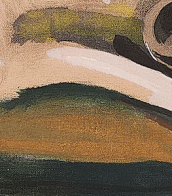

Walter Ophey was a German artist. He was known for his modernist paintings, which often depicted landscapes and still-life scenes.
Ophey studied at the Academy of Fine Arts in Düsseldorf. His early work was influenced by Impressionism, but he later became associated with the Expressionist movement.
In 1909 Ophey, together with some other Düsseldorf artists, formed the artistic group the Special Union (Sonderbund). The first chairman of the Special Union was the well-known German philanthropist and collector Carl Ernst Osthaus. In the following years this group became one of the most powerful avant-garde art movements in Germany.
Ophey's paintings are characterized by their bright colors and bold, simplified forms. He often depicted rural landscapes and still-life scenes, infusing them with a sense of emotional intensity. He was also known for his use of color, which he used to convey mood and atmosphere.
Ophey's work was exhibited extensively during his lifetime, including at the Berlin Secession and the Salon d'Automne in Paris. Despite his relatively short career, he was recognized as an important figure in the development of modernist painting in Germany.
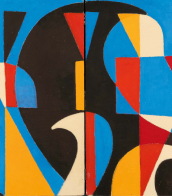

Walter Ophey was a German artist. He was known for his modernist paintings, which often depicted landscapes and still-life scenes.
Ophey studied at the Academy of Fine Arts in Düsseldorf. His early work was influenced by Impressionism, but he later became associated with the Expressionist movement.
In 1909 Ophey, together with some other Düsseldorf artists, formed the artistic group the Special Union (Sonderbund). The first chairman of the Special Union was the well-known German philanthropist and collector Carl Ernst Osthaus. In the following years this group became one of the most powerful avant-garde art movements in Germany.
Ophey's paintings are characterized by their bright colors and bold, simplified forms. He often depicted rural landscapes and still-life scenes, infusing them with a sense of emotional intensity. He was also known for his use of color, which he used to convey mood and atmosphere.
Ophey's work was exhibited extensively during his lifetime, including at the Berlin Secession and the Salon d'Automne in Paris. Despite his relatively short career, he was recognized as an important figure in the development of modernist painting in Germany.


Walter Ophey was a German artist. He was known for his modernist paintings, which often depicted landscapes and still-life scenes.
Ophey studied at the Academy of Fine Arts in Düsseldorf. His early work was influenced by Impressionism, but he later became associated with the Expressionist movement.
In 1909 Ophey, together with some other Düsseldorf artists, formed the artistic group the Special Union (Sonderbund). The first chairman of the Special Union was the well-known German philanthropist and collector Carl Ernst Osthaus. In the following years this group became one of the most powerful avant-garde art movements in Germany.
Ophey's paintings are characterized by their bright colors and bold, simplified forms. He often depicted rural landscapes and still-life scenes, infusing them with a sense of emotional intensity. He was also known for his use of color, which he used to convey mood and atmosphere.
Ophey's work was exhibited extensively during his lifetime, including at the Berlin Secession and the Salon d'Automne in Paris. Despite his relatively short career, he was recognized as an important figure in the development of modernist painting in Germany.
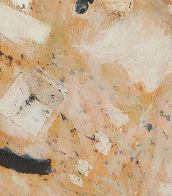

Walter Ophey was a German artist. He was known for his modernist paintings, which often depicted landscapes and still-life scenes.
Ophey studied at the Academy of Fine Arts in Düsseldorf. His early work was influenced by Impressionism, but he later became associated with the Expressionist movement.
In 1909 Ophey, together with some other Düsseldorf artists, formed the artistic group the Special Union (Sonderbund). The first chairman of the Special Union was the well-known German philanthropist and collector Carl Ernst Osthaus. In the following years this group became one of the most powerful avant-garde art movements in Germany.
Ophey's paintings are characterized by their bright colors and bold, simplified forms. He often depicted rural landscapes and still-life scenes, infusing them with a sense of emotional intensity. He was also known for his use of color, which he used to convey mood and atmosphere.
Ophey's work was exhibited extensively during his lifetime, including at the Berlin Secession and the Salon d'Automne in Paris. Despite his relatively short career, he was recognized as an important figure in the development of modernist painting in Germany.
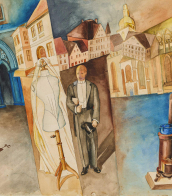

Walter Ophey was a German artist. He was known for his modernist paintings, which often depicted landscapes and still-life scenes.
Ophey studied at the Academy of Fine Arts in Düsseldorf. His early work was influenced by Impressionism, but he later became associated with the Expressionist movement.
In 1909 Ophey, together with some other Düsseldorf artists, formed the artistic group the Special Union (Sonderbund). The first chairman of the Special Union was the well-known German philanthropist and collector Carl Ernst Osthaus. In the following years this group became one of the most powerful avant-garde art movements in Germany.
Ophey's paintings are characterized by their bright colors and bold, simplified forms. He often depicted rural landscapes and still-life scenes, infusing them with a sense of emotional intensity. He was also known for his use of color, which he used to convey mood and atmosphere.
Ophey's work was exhibited extensively during his lifetime, including at the Berlin Secession and the Salon d'Automne in Paris. Despite his relatively short career, he was recognized as an important figure in the development of modernist painting in Germany.
